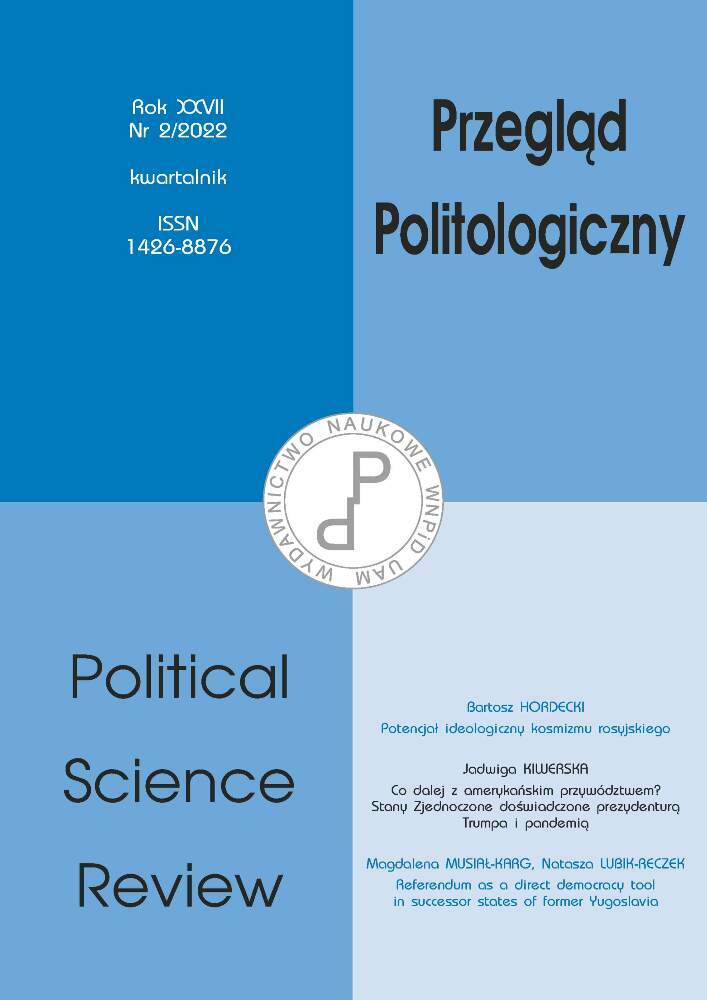Abstract
The aim of the article is to present the preliminary results of a survey conducted among Lithuanian students on their opinion about i-voting and the possibility of implementing this alternative voting method in Lithuania. The main aim of the research was to answer the following research questions: What is the attitude of young Lithuanians towards voting via the Internet? What threats, benefits and challenges related to the potential implementation of i-voting in Lithuania are perceived by the surveyed group. The research showed that the respondents believe that the greatest barriers to the introduction of i-voting in Lithuania are: the threat of cybercrime, the possibility of violating the principle of secret voting, the lack of political will, the need to change the law; young voters would be willing to vote via the Internet and this could have a positive impact on the turnout among this group of voters; the complexity of the challenges related to implementing i-voting means that there is no chance of its quick introduction.
Funding
The article was prepared under the grant „Specifics of Electronic Voting and Possibilities of its Implementation in General Elections in Lithuania,” funded by the IDUB of the University of Lodz for research for PhD students and participants in PhD schools at the University of Lodz.
References
Baranowski M. (2014), Wprowadzenie do socjologicznego ujęcia problemu demokracji i roli obywatela, in: Demokracja i rola obywatela. O napięciu pomiędzy państwem, społeczeństwem i procesami globalizacyjnymi, ed. M. Baranowski, Wydawnictwo Naukowe Wydziału Nauk Społecznych Uniwersytetu im. Adama Mickiewicza w Poznaniu, Poznań, ISBN: 978-83-62243-93-8.
Emigracija Lietuvoje 1990–2021 (2021), https://mapijoziai.lt/emigracija-lietuvoje-1990-2019-m/, 14.12.2021.
Ercan S. A., Gagon J.-P. (2014), The crisis of Democracy. Which Crisis? Which Democracy?, “Democratic Theory”, vol. 1, 2, pp. 1–10, https://doi.org/10.3167/dt.2014.010201.
Giedrius U. (2020), Voter turnout rates by age groups. Comparision of the first round of Lithuanian Seimas elections (2016 vs. 2020), https://public.tableau.com/app/profile/giedrius8485/viz/VoterturnoutbyagegroupsinLithuania_english_version/Dashboard1, 20.02.2022.
Konstantinas A. (2007), Elektroninių rinkimų įgyvendinimo galimybės: pasaulinė patirtis ir Lietuvos perspektyva, https://vb.mruni.eu/object/elaba:1824705/1824705.pdf, 14.12.2021.
Kuczyńska-Zonik A. (2019), Zagrożenia w cyberprzestrzeni – nowe wyzwania dla państw bałtyckich, “Komentarze Instytuty Europy Środkowej”, no. 8, https://ies.lublin.pl/wp-content/uploads/2019/04/ies-komentarze-8-8-2019.pdf, 14.12.2021.
Laurinavičienė B. (2021), Tyrimas: gyventojai internetu naudojasi vis daugiau, https://www.vz.lt/inovacijos/technologijos/2021/05/29/tyrimas-gyventojai-internetu-naudojasi-vis-daugiau, 14.12.2021.
Madise Ü., Martens T. (2006), E-voting in Estonia 2005. The first practice of country-wide binding Internet voting in the world, Electronic Voting 2006: 2nd International Workshop Co-organized by Council of Europe, ESF TED, IFIP WG 8.5 and E-Voting.CC August, 2nd – 4th, 2006 in Castle Hofen, Bregenz, Austria, https://dl.gi.de/handle/20.500.12116/29155, 14.12.2021.
Malużinas M. (2021a), Lithuanian Democracy under the State of Emergency: Will the COVID-19 Pandemic Affect the Assessment of the State of Democracy in the Country? – System Analysis, “Athenaeum”, vol. 72, no. 4, pp. 88–105, https://doi.org/10.15804/athena.2021.72.05.
Malużinas M. (2021b), Wybory parlamentarne w czasie pandemii COVID-19. Przykład wyborów litewskich w 2020 r., “Athenaeum”, vol. 69, no. 1, pp. 216–233, https://doi.org/10.15804/athena.2021.69.13.
Malużinas M. (2021c), Czy głosowanie elektroniczne to przyszłość litewskiej demokracji?, Ośrodek Analiz INoPiB, https://npb.usz.edu.pl/glosowanie-elektroniczne-przyszlosc-litewskiej-demokracji-osrodek-analiz/, 14.12.2021.
Marzęcki R., Stach Ł. (2016), Youth of Today and the Democracy of Tomorrow. Polish Students’ Attitudes Toward Democracy, “Education and Society”, no. 34(1), pp. 39–59, https://doi.org/10.7459/es/34.1.04.
Merkel W. (2014), Is There a Crisis of Democracy?, “Democratic Theory”, vol. 1, issue 2, pp. 11–25, https://doi.org/10.3167/dt.2014.010202.
Musiał-Karg M., Kapsa I. (2021), Debate: Voting challenges in a pandemic–Poland, “Public Money and Management”, vol. 4, no. 1, https://doi.org/10.1080/09540962.2020.1809791.
Musiał-Karg M. (2015), Głosowanie elektroniczne jako alternatywna metoda uczestniczenia w wyborach – opinie Polaków, “Political Preferences”, no. 10, pp. 87–107, https://doi.org/10.6084/m9.figshare.2059443.
Susha I., Kripp M. J. (2011), How to successfully implement internet voting? Strategic recommendations on overcoming remote e-voting challenges, “Working Paper Series on Electronic Voting and Electronic Participation”, no. 1.
Weiss J. (2020), What Is Youth Political Participation? Literature Review on Youth Political Participation and Political Attitudes, “Frontiers in Political Science”, no. 2:1, https://doi.org/10.3389/fpos.2020.00001.
Wójcik S. (2014), Demokracja i jej kryzysy. Czy partycypacja może być remedium?, in: Demokracja i rola obywatela. O napięciu pomiędzy państwem, społeczeństwem i procesami globalizacyjnymi, ed. M. Baranowski, Wydawnictwo Naukowe Wydziału Nauk Społecznych Uniwersytetu im. Adama Mickiewicza w Poznaniu, Poznań, ISBN: 978-83-62243-93-8.
Van der Meer T. W. G. (2017), Political Trust and the “Crisis of Democracy”, “Oxford Research Encyclopedia of Politics”, https://oxfordre.com/politics/view/10.1093/acrefore/9780190228637.001.0001/acrefore-9780190228637-e-77, 20.02.2022.

